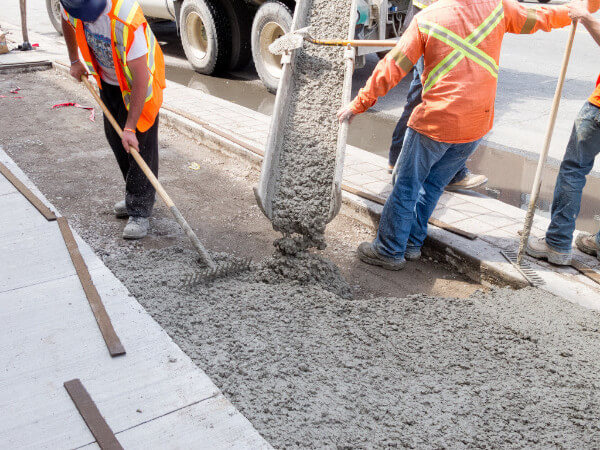
While concrete is extremely strong, it can also be very brittle if it’s not properly mixed and cured. Concrete failure can occur in a variety of ways because of the versatility of this material and all of its applications.
Each type of failure is different and has its own causes and solutions. It’s important to understand how these common types of failures occur so that your project is not negatively affected.
Keep reading to learn 5 tips for preventing concrete failure.
1. Avoid trapped air
Trapped air bubbles in concrete can cause it to fail. Concrete is a mixture of gravel, sand, and cement (among other ingredients), and when this mix gets poured into forms or molds, trapped air bubbles can form.
These bubbles result in weak spots that aren’t able to handle pressure.
To avoid trapped air when mixing concrete, ideally, you should hire a professional with a mixer truck rather than attempting to mix and pour on your own.
When mixing on your own, you risk adding too much water to the mix or mixing it for too long. This can cause small cracks and fissures which will leave your concrete vulnerable as well.
2. Don’t overload concrete forms
Overloading concrete is another common cause of concrete failure. While concrete is one of the strongest materials on the planet, different types have different limits. For example, reinforced concrete should be used if you anticipate supporting a large weight or structure.
Unfortunately, some cheap contractors like to cut corners here by using the wrong type of concrete to complete the job faster. Then, once heavy loads are placed on the concrete, it cracks.
3. Always use good quality raw materials
Using good quality raw materials is another way to avoid concrete failure. This goes for both the sand and gravel used in your mix as well as the cement itself.
If you’re not using a reputable supplier, there’s no telling what sorts of additives they may be including in their products (or if any at all).
For example, recycled or fly ash cement can sometimes be used in place of traditional Portland cement. While this is cheaper, it also has a shorter lifespan and may not meet the standards you’re looking for.
The same goes for sand or gravel that doesn’t measure up to your specifications. If it’s too coarse, the concrete mix won’t have enough cohesion between particles which can cause the material to crumble.
If you want strong, durable, and long-lasting concrete, always make sure to use a reputable contractor and supplier for raw materials.
4. Use water treated with low levels of dissolved sulphate
Using water with low levels of dissolved sulphate is another way to avoid concrete failure. You see, metal ions (especially iron or steel) can lead to the formation of rust within your concrete mix which will make it vulnerable and prone to cracking.
The easiest thing you can do here is use deionized water in place of tap water. If this isn’t available, try to use water with low levels of dissolved sulphate. This will prevent the metal ions from being deposited into your concrete mix which will result in a stronger material overall.
5. Don’t use high-silica aggregates in areas with high humidity
If you’re using high-silica aggregates in areas with high humidity, you may run into concrete failure. This is because the aggregates will absorb moisture from the air, leading to cracks within your material over time.
For example, if you’re creating a sidewalk or patio in a high-humidity area like Louisiana, and you use this sort of aggregate without a waterproof coating, you may be in for a rude awakening.
6. Hire the professionals
Concrete failure is expensive. The best way to avoid it is by hiring the professionals at Port Aggregates.
At PAI, our professional concrete contractors are skilled in creating bubble-free, high-quality pours in high-humidity areas like Louisiana. We use only the best quality materials for our mixes and never cut corners to save money or time.
Contact us today to request a quote for your next residential or commercial project!
The post How to Avoid Concrete Failure appeared first on Port Aggregates.
Did you miss our previous article…
https://cedarparkconcrete.org/?p=197